War Read online
Watchers War
Peter Lerangis
Contents
1
2
3
4
5
6
7
8
9
10
11
12
13
14
15
16
A Biography of Peter Lerangis
WATCHERS
Case File 6955
Name: Jacob Branford
Age: 14
First contact: 57.34.43
Acceptance:
1
“Jake!”
Jake Branford looked up from his green steno notebook.
It’s only Byron. Don’t lose the thread. Keep it going. It’s good, Jake. It’s like you’re there.
defeat, he wrote.
“Hello-o-o-o! Welcome to real life, baby brother! Get down here right now!”
“WAIT!” Jake blurted out.
He tried to focus on the page again. The nineteenth century. The Civil War. Come on, Jake, feel it. FEEL IT.
Nothing.
The mood was gone.
Jake couldn’t write without the mood.
He reached into the open steamer trunk next to him. Lying on top of a pile of old junk was a leather-sheathed dagger and a threadbare Civil War uniform and cap. Union Army. From the body of one of Jake’s ancestors, who died in the war. Or so went the rumor. Mom didn’t know for sure. She couldn’t care less about stuff like that.
The cap.
Jake put it on. The wool was soft, almost greasy from the years of accumulated grime. It smelled of the past, musty and dark.
From a nearby stack of books he pulled out a slim volume entitled Nineteenth-century Hobson’s Corner: A Photo History. He flipped it open, scanning the images. Main Street with its ancient-sounding stores — Central Apothecary, Hobson’s Corner Dry Goods — the three old brick houses at the top of the hill, the encampment of grim, uncomfortable-looking Civil War soldiers.
In the distance he heard artillery fire. He caught a whiff of campfire smoke and shivered in the morning cool. He felt the grit of gunpowder under his fingernails.
His heart began to slam in a way that never happened during computer games. Or on the playing field. Or even in Civil War “reenactments,” where you dressed up and pretended to be in combat, until a car horn spoiled the mood or someone had to leave for a dentist appointment.
Yes.
I’ve got it.
I’m there.
THIS was real life.
A life where things mattered. Where every day you had something to fight for.
A country on the brink of destroying itself.
A war.
Dirty, loud, sneaky, exhausting.
Totally cool.
You were born at the wrong time, Jake.
Way wrong.
Jake smiled.
Not Jake. Corporal Branford of the Union Army.
He picked up the notebook and pen again. And he began to write.
“WHICH PART OF THE WORD ‘NOW’ DON’T YOU UNDERSTAND?”
Jake’s pen fell to the page.
Gone.
Ripped apart like a canvas tent in a cannon blast.
The mood was over.
Jake slammed the steno notebook shut.
He dug his fingers under the uniform, below the blankets and tablecloths. When he felt the bottom, he pulled at a silken cord, opening a small, empty compartment.
With his other hand, he flipped the notebook so that the cover was faceup:
DO NOT OPEN
If Found, Please Return to
Jake Branford
25 Magnolia Avenue
Hobson’s Corner, Maryland 21000
302-555-9072
Then he slipped the book into the hiding place.
“JAAAAAAAAAKE!”
Jake replaced the cap, let the lid fall shut, and left the attic.
He resisted the temptation to take the dagger.
The brother?
No, This one
He has no chance.
He has no choice.
His love for war —it’s
Unhealthy.
Fanatical.
But very, very useful.
To whom?
I’m afraid to say.
2
“WHAT ON EARTH DO you do up there?” Byron snapped. He was pacing the living room, glancing out the front door. “Never mind. I don’t want to know. Just come with me.”
“Where?”
“There.” Byron gestured up the block, where a sports car and a black-windowed limo idled at the curb. Two men and a woman, all wearing sunglasses, stood in front of the cars. “Do you recognize the guy with the gray beard?”
Jake peered out. “Your parole officer?”
“Ha-ha. It’s Gideon Kozaar, Jake. The Gideon Kozaar? The movie director?”
“Never heard of him. What’s he done?”
Byron rolled his eyes. “You were in diapers when he made his last movie. That’s his style. Nobody hears about him for years — and then, boom, the rumors start: he’s making another film. Only no one ever knows for sure, because Kozaar keeps everything about the movie totally secret until opening day. But we know about this one — because his casting people were at the high school today, looking for total unknowns. Teens.”
“Is that what you called me down for? I don’t want to be in a movie.”
“Not you — me!”
“You can’t act! You had two lines in the school play.”
“Seven. And you don’t need experience. He said so. He doesn’t even use a script. He just gives the actors a situation and they improvise. Is that easy or what? And if you get cast, you’re automatically in the screen actors’ union, SAG. Anyway, I had a great audition —but about seventeen million other kids auditioned, too. They can’t possibly remember us all. So I have to stand out, Jake. To be different from the rest. You have to help me — ”
“Byron?” Jake said, turning back into the house. “Remind me to tell you sometime how much I hate your guts.”
“The movie’s about the Civil War, dork-face!”
Jake stopped in his tracks.
A Civil War movie? Here?
The feeling.
It was back. Instantly. Right there in the living room.
Careful, you’re talking to Byron the truth-challenged.
“I don’t believe you,” Jake said.
“In the audition they asked us to improvise a Civil War scene. Like we were on the battlefield.”
“Where are they filming it?”
“How should I know? It’s a secret. Anyway, you’re the expert. Tell me how I can impress them — like, dress up in that costume upstairs, go out there and talk in an authentic Civil War accent — ?”
“It’s not a costume, it’s a uniform,” Jake said. “And there’s no such thing as a Civil War accent.”
“So tell me what to do.”
Jake went to the door and peered up the block. One of Gideon Kozaar’s assistants was pointing to a house and comparing it to a sketch.
“That house wasn’t here during the war,” Jake murmured.
“So?” Byron snapped.
“So, they’re talking about it. Drawing it. Like they’re going to use it in the film. And if they do, they’ll be wrong.”
“That’s it. I’ll tell them that!”
No.
I will.
“Let’s go,” Jake said. “I’ll do the talking. You just nod and try to look smart. That’ll be a perfect acting assignment for you.”
He stepped out the front door before Byron could reply.
“Yo!” Jake called out. “That house was built in, like, 1910.”
Three
pairs of black lenses stared back at Jake. Three bored, annoyed expressions.
“You can’t say ‘hello’ first?” Byron whispered, walking behind Jake.
Jake gestured back to his own house. “Ours was here during the Civil War. So were Numbers Thirty-seven, Fifteen, and Fifty-three — except Fifteen didn’t have the extra wing.”
“Uh, this is my baby brother, Jake,” Byron blurted out. “Jake, this is Mr. Kozaar and his talent scouts — ”
“Set designers,” the woman replied.
“Right. Well, I was just telling Jake about my audition, and — ”
“What’s the film about?” Jake interrupted. “The Massacre at Standish Crossing? No, wait — the dynamiting of the Underground Railroad near Spencer’s Bluff?”
Gideon Kozaar cocked his head toward Jake. His face was wrinkled and thin, his hair brittle and almost white. “I don’t know about those,” he said in a soft, deep voice.
Jake nodded. “I know. The Battle of Dead Man’s Trace, right? Where the Union Army got slaughtered by the Confederates because of their own stupidity. That’s the one everyone knows about.”
“Oh?” said Gideon Kozaar.
“You don’t hear about the others. I have, but I know just about everything about the war. It’s like a hobby, I guess — ”
“Jake’s the history buff in the family,” Byron quickly interjected. “I’m the actor.”
“My great-great-great grandfather on my mom’s side died in the Battle of Dead Man’s Trace,” Jake barreled on. “Well, supposedly. We don’t know his name. People around here have sort of forgotten the details about that battle — even exactly where Dead Man’s Trace was. They’re still sort of embarrassed about the defeat — which is weird, I know, because it was so long ago, but — ”
“So! Uh, would you guys like to see our authentic Civil War house?” Byron interrupted.
“ — Anyway, to be honest,” Jake went on, “in my opinion the Standish Crossing Massacre would be a much better idea for a movie than — ”
“Jake!” Byron snapped. He turned quickly to Gideon Kozaar. “We have antiques and everything. I mean, if you want to do research, hey, this is the place. I can show you around and — ”
“Mom said no one’s allowed in while she and Dad are in Chicago,” Jake said.
Byron glared at him. “She won’t mind if Gideon Kozaar visits. So, you guys want coffee and doughnuts?”
The two set designers looked at Gideon Kozaar.
He nodded.
“Great,” Byron said. “Jake will get them from the deli.”
“What?” Jake protested.
“A dozen assorted. Chocolate cruller for me. Take your time. ’Bye!”
The two set designers followed Byron as he started back toward the house.
“But —but I — ”
“I’ll give you a ride,” rumbled the voice of Gideon Kozaar.
Jake spun around. “You will?”
Gideon Kozaar removed his sunglasses.
Jake’s breath caught in his throat.
Silver.
Green.
Yellow.
Kozaar’s eyes seemed to be changing color. Slowly, like tinted shades drawn across a window. Jake tried to look away but he couldn’t.
“Tell the driver the address,” Kozaar said, opening the back door of the limo.
“Hey! Aren’t you coming?” Byron shouted.
Jake didn’t answer Byron. He felt numb.
He’s a stranger.
He’s world-famous.
He’s creepy.
He’s interesting.
And you don’t say no to Gideon Kozaar.
“The Corner Pantry,” Jake said, climbing into the backseat. “Take a left when you get to Main.”
Gideon Kozaar went around and slipped in the other side.
Jake caught a quick glimpse of Byron’s bewildered face as the limo pulled away.
Jake swallowed hard and sat back. The car was dead silent. Not even a radio. Gideon Kozaar stared straight ahead.
“Thanks,” Jake finally said, “for the ride, I mean — ”
“What would you have done?” Gideon Kozaar interrupted.
“Done?”
“At the Battle of Dead Man’s Trace. If you were alive then, fighting for the Union.”
Good question.
Jake thought a moment. He tried to remember the details of what he’d read. It wasn’t much.
“Well, I don’t know exactly where it happened,” he finally admitted, “or the details of the battle. No one does. But if I were there, and I knew the geography and the Union plans, I would have figured out the ambush. I just know it. And I wouldn’t have let the Confederates anywhere near the camp. I would have fought them bare-handed if I had to.”
A slow smile spread across Gideon Kozaar’s face as the limo began to slow down.
“Here’s the Corner Pantry,” the driver said.
The car stopped at the curb, and the driver got out to open Jake’s door.
“Do you want anything?” Jake asked as he climbed out.
“Yes,” Gideon Kozaar said. “But I can wait.”
Then he gave a signal, and the car drove off.
Byron was pacing the living room alone when Jake got back.
“Delivery!” Jake shouted. “Where is everybody?”
“I can’t believe what you did,” Byron murmured.
“They left already?” Jake asked.
“You drove away with him. You stole him.”
Jake put down his bag on the coffee table, where an old brass oil lamp used to be. “Uh, Byron? Something’s missing here.”
“I rented it to them.”
“Rented?”
“They need props. For the movie. So I showed them around and — ”
“Are you crazy? Mom and Dad will kill you!”
“Why? They gave me receipts. They’re going to pay us.”
“What else did you give them?”
“Nothing. Just some junk from the attic.”
The attic.
Jake bolted upstairs.
The door was open. He flicked on the light.
The room felt different. Emptier.
The coat rack.
The old milk can.
Both taken.
He ran into the corner and opened the steamer trunk. A blanket lay on top, wrinkled. The uniform, cap, and dagger were gone.
Clever
As usual, one step ahead of us.
3
“BYRON!” JAKE SHOUTED.
He flew out of the attic, then stopped short.
The journal.
Jake raced back to the trunk and flipped it open again. He dug his hand to the bottom, yanked on the secret-compartment door, and reached in.
Still there.
He shoved it into his back pocket and bolted downstairs.
“Who said you could give that uniform away, Byron?”
Byron was making faces in the living room mirror. “Is this a good nineteenth-century look?”
“It’s from the Civil War! Your great-great-great grandfather wore it!”
“Whoa, hold on, Jake. You think he did. No one knows for sure. Mom says it might have belonged to him. She doesn’t even know his name.”
“You had no right!”
“Says who?”
Me.
It’s valuable to me.
It connects me. To a place where you’ll never go.
To a time I should have been born in.
To a fight. A real one. Bigger than this idiotic argument. Bigger than you or me.
It connects me to a part of myself.
The words formed clearly in Jake’s mind. But he didn’t say a word.
Byron wouldn’t understand.
And Byron was unimportant now.
Only the uniform mattered. The uniform and the cap and the dagger.
Without them, nothing mattered.
Nothing but the present. And that wasn’t enough. He had to fi
nd the stuff and bring it back. Jake bolted.
“Hey, where are you going?” Byron demanded. “I don’t know.” He let the door slam behind him.
HONNNNNK!
Jake’s bike skidded to a stop. His rear tire fanned out, sending up a spray of water.
A red pickup swerved across his path, missing him by inches.
The driver’s angry rant was swallowed up by the din of the downpour.
Jake caught his breath, wiping the water from his brow.
The rain had been sudden. It had started when Jake was biking by the Cranfield Mall. Now it was falling so fiercely he could barely see.
Why am I doing this?
No way would Gideon Kozaar be filming in this weather.
Time to cut bait, Jake.
Across the intersection was a steep wooded hill, the southern end of the Menoquan Woods that jutted into Hobson’s Corner.
The route home was a long ride around the woods.
The shorter way was straight through. Up and over the hill, through the trees. Muddy but direct. Dangerous, too. Blocked off by a rusted metal fence with NO TRESPASSING signs. No one ever went there, as far as Jake knew.
But the fence had a hole. And Jake was wet. And tired.
He looked up through squinted eyes.
No lightning. It would be safe.
Jake turned his bike toward the hill and began pedaling.
His treads dug in. The soil was wet but packed.
He stood. Pushed.
At the top, the bike slipped. Jake tried to right it. The tires gave out from under him.
Gritting his teeth, he hurtled over the handlebars.
And landed with a thud.
He jumped to his feet, picked up the bike, and looked back down the hill.
Uh-uh. Too slippery.
KAAAA-BOOM!
Great. Now it decides to thunder.
No lightning yet.
He pedaled over the top of the hill. Further into the woods.
The path meandered. Split. Split again.
The rain weighed down his eyelashes. The trees melded together in his vision.
Left here. Right. Right.
He was guessing now. Nothing was familiar.
The path petered out, then stopped.
KAAAA-BOOM!
The sky flashed a dull white.
That was close.
Jake let his bike stop. He wiped his brow.

 The Orphan
The Orphan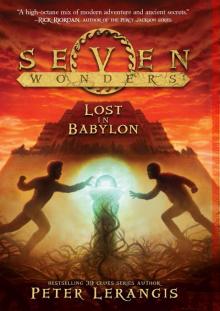 Lost in Babylon
Lost in Babylon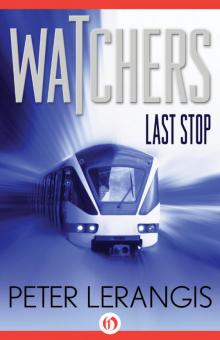 Last Stop
Last Stop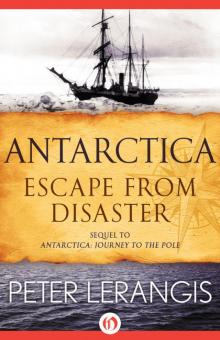 Antarctica Escape from Disaster
Antarctica Escape from Disaster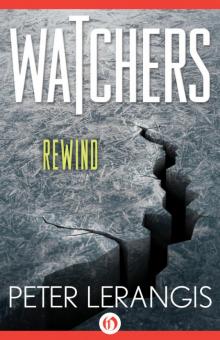 Rewind
Rewind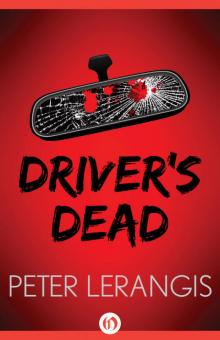 Driver's Dead
Driver's Dead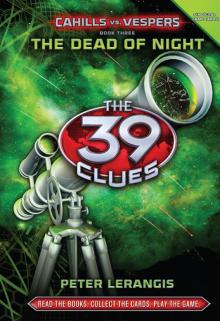 The Dead of Night
The Dead of Night The Promise
The Promise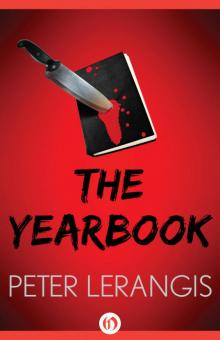 The Yearbook
The Yearbook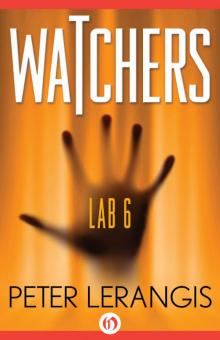 Lab 6
Lab 6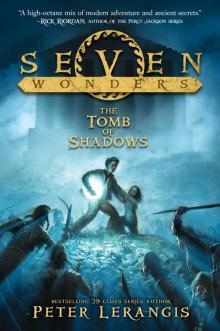 The Tomb of Shadows
The Tomb of Shadows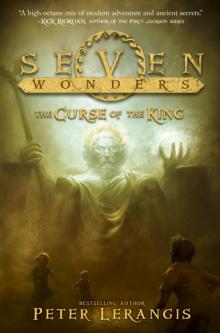 The Curse of the King
The Curse of the King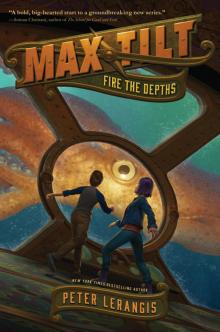 Max Tilt: Fire the Depths
Max Tilt: Fire the Depths The Fall Musical
The Fall Musical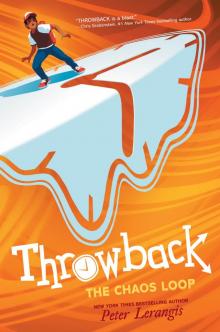 The Chaos Loop
The Chaos Loop Island
Island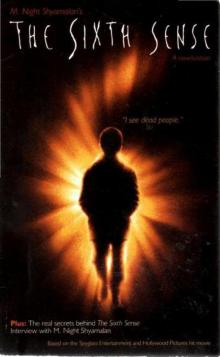 The Sixth Sense
The Sixth Sense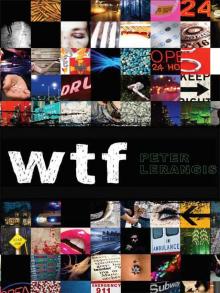 Wtf
Wtf War
War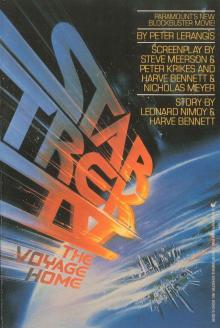 Star Trek IV, the Voyage Home
Star Trek IV, the Voyage Home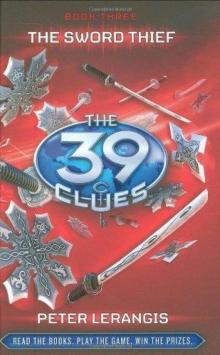 The Sword Thief
The Sword Thief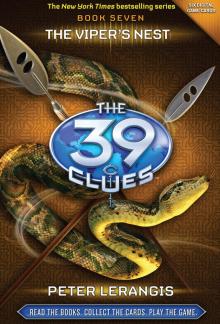 The Viper's Nest
The Viper's Nest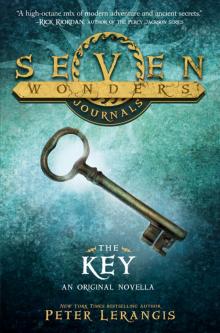 The Select
The Select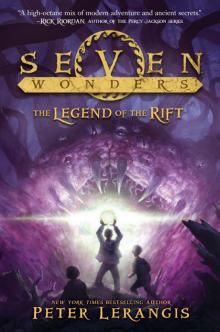 The Legend of the Rift
The Legend of the Rift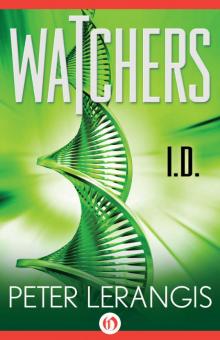 I.D.
I.D. The Sword Thief - 39 Clues 03
The Sword Thief - 39 Clues 03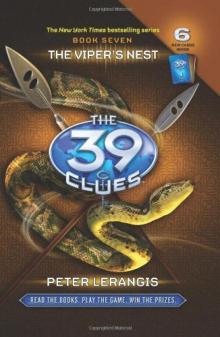 The 39 Clues Book 7: The Viper's Nest
The 39 Clues Book 7: The Viper's Nest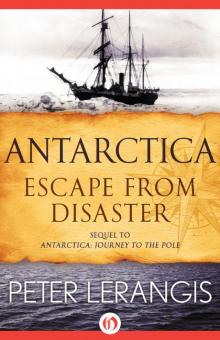 Antarctica
Antarctica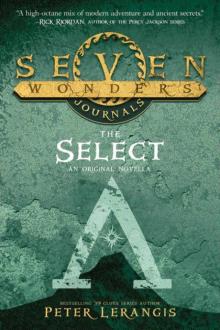 Seven Wonders Journals: The Select
Seven Wonders Journals: The Select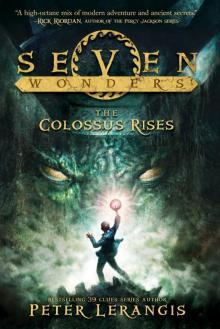 Seven Wonders Book 1: The Colossus Rises
Seven Wonders Book 1: The Colossus Rises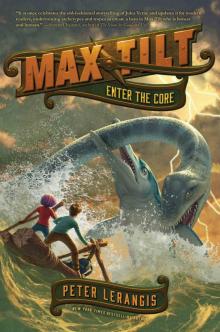 Enter the Core
Enter the Core![39 Clues _ Cahills vs. Vespers [03] The Dead of Night Read online](http://i1.bookreadfree.com/i1/04/02/39_clues_cahills_vs_vespers_03_the_dead_of_night_preview.jpg) 39 Clues _ Cahills vs. Vespers [03] The Dead of Night
39 Clues _ Cahills vs. Vespers [03] The Dead of Night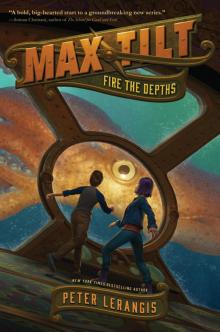 Fire the Depths
Fire the Depths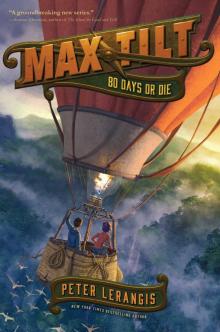 80 Days or Die
80 Days or Die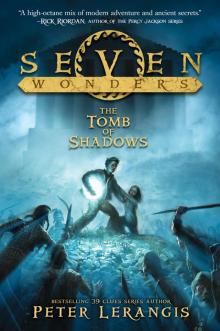 Seven Wonders Book 3
Seven Wonders Book 3